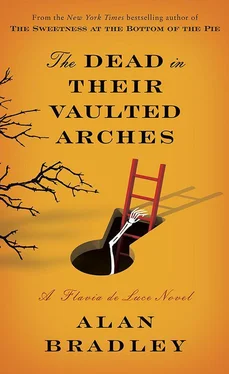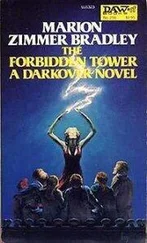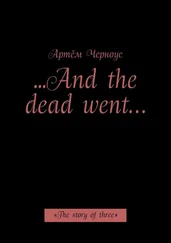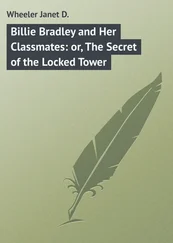“Why is the House of Commons like a ciné sound projector?”
“Because they both have a Speaker !”
I could hardly wait to tell it at the breakfast table.
But that had been in happier times.
I fingered the snap and opened the second box.
This one contained a matching device, smaller, with a clockwork crank on its side and several lenses mounted in a rotating turret on its snout.
A ciné camera.
I lifted the thing to my face and peered through the viewfinder, moving the camera slowly from right to left as if I were filming.
“Buckshaw,” I intoned in a newsreel voice. “Ancestral home of the family de Luce since time immemorial … a house divided … a house apart.”
I put the camera down rather abruptly—and rather roughly, I’m afraid. I did not feel like going on with this.
It was then that I noticed for the first time the little gauge on its body. The indicator needle was calibrated from zero to fifty feet, and it stood nearly—but not quite—at the end of its range.
There was still film in the camera—even after all these years.
And if I were any judge, about forty-five feet of it had been exposed.
Exposed but never developed!
My heart lunged suddenly into my throat, trying to escape.
I nearly choked on it.
If my suspicions were correct, this film, this camera, might well contain hidden images of my dead mother, Harriet.
Within the hour, having made my preparations, I was in my chemical laboratory in Buckshaw’s abandoned east wing. The lab had been constructed and outfitted towards the end of the Victorian era by the father of Harriet’s uncle Tarquin de Luce, for a son whose spectacular collapse at Oxford was still, even after more than half a century, only whispered about among those dreaming spires.
It was here in this sunny room at the top of the house that Uncle Tar had lived, worked, and eventually died, his research into the first-order decomposition of nitrogen pentoxide having led, or so it had been hinted, to the destruction in Japan, six years ago, of Hiroshima and Nagasaki.
I had happened upon this kingdom of abandoned and glorious glassware some years ago during a rainy-day exploration of Buckshaw and promptly claimed it as my own. By poring over his notebooks and duplicating many of the experiments in my late uncle’s remarkable library, I had managed to make of myself a more than competent chemist.
My specialty was not, though, the pentoxide of nitrogen, but rather the more traditional poisons.
I pulled the ciné camera from under my jumper where I had stuffed it just in case, in my descent from the attics, I had been intercepted by one of my sisters. Feely had turned eighteen in January and would be, for just a short while longer, seven years older than me. Daffy, with whom I shared a birthday, would soon be fourteen, while I was now almost twelve.
In spite of being sisters, we were none of us what you would call great friends. We were still working out new ways to torture one another.
In the small photographic darkroom at the far end of the laboratory, I reached for a brown glass bottle on the shelf. METOL, it said on the label in Uncle Tar’s unmistakable spidery handwriting.
Metol, of course, was nothing more than a fancy name for plain old monomethyl-p-aminophenol sulfate.
I had skimmed through the dark-stained pages of a photo reference manual and found that what needed to be done with the film was actually quite straightforward.
First step was the developer.
I groaned as I pulled the stopper from the bottle and decanted a sample into a beaker. Twenty years on the shelf had taken its toll. The metol had oxidized and become an acrid brown sludge, the color of last night’s coffee grounds.
My groan turned slowly to a grin.
“Do we have any coffee?” I asked, strolling into the kitchen with an air of pretended boredom.
“Coffee?” Mrs. Mullet asked. “What you want with coffee? Coffee’s no good for girls. Gives you the colly-wobbles, like.”
“I thought that if someone came to call, it would be nice to offer them a cup.”
You’d think I’d asked for champagne.
“And ’oo was you expectin’, miss?”
“Dieter,” I lied.
Dieter Schrantz was the German ex–prisoner of war from Culverhouse Farm who had recently become engaged to Feely.
“Never mind,” I told Mrs. M. “If he comes, he’ll have to settle for tea. Do we have any biscuits?”
“In the pantry,” she said. “That nice tin with Windsor Castle on the lid.”
I gave her an idiotic grin and popped into the pantry. At the back of a high shelf, just as I had remembered, was a bottle of Maxwell House ground coffee. In spite of the rationing, it had been brought as a gift from the nearby American air base at Leathcote by Carl Pendracka, another of Feely’s admirers who, in spite of Father’s belief that Carl was of the bloodline of King Arthur, had been unhorsed in the recent matrimonial sweepstakes.
Offering up a silent prayer of thanks for the general bagginess of old-fashioned clothing, I shoved the coffee under one side of my sweater, stuffed a large wire kitchen whisk under the other, clamped a couple of Empire biscuits between my teeth, and made my escape.
“Thanks, Mrs. M,” I mumbled around the mouthful of biscuits, keeping my hunched back to her.
Safely back upstairs in my laboratory, I emptied the coffee into a cone-shaped paper filter, placed it in a glass funnel, and, lighting a Bunsen burner, waited for the distilled water in the teakettle to come to the boil.
Chemically speaking, I remembered, the developing of film was simply a matter of reducing its silver halide crystals through deoxidization to the basic element, silver. If metol would do the job, I reasoned, so would caffeine. And so, for that matter, would vanilla extract, although I knew that if I absconded with Mrs. Mullet’s vanilla extract, she’d have my guts for garters. The hoarded coffee was a much safer bet.
When the water had boiled for two minutes, I measured out three cups and poured it over the coffee. It smelled almost good enough to drink.
I stirred the brown liquid to break up the bubbles and foam, and when it had cooled sufficiently, stirred in seven teaspoons of sodium carbonate: good old, jolly old washing soda.
The initially welcoming coffee aroma was now changing—the stench increasing by the second. To be perfectly honest, it now smelt as if a coffeehouse in the slums of Hell had been struck by lightning. I was happy to be able to leave the room, even if only for a few minutes.
One more quick trip to the attics to retrieve the enamel bedpan I had spotted among the de Luce family relics, and I was nearly ready to proceed.
That being done, I gathered up my equipment and locked myself into the darkroom.
I switched on the safelight. There was a brief red flash—a tiny pop .
Oh no! The blasted bulb had blown out.
I opened the door and set out in search of a new one.
There were times when we grumbled about the fact that Father had ordered Dogger to replace most of the bulbs at Buckshaw with ten-watt substitutes in order to save on electricity. The only one of us who didn’t seem to mind was Feely, who needed only a dim and feeble light to write in her diary and to examine her spotty hide in the looking glass.
“Low wattage wins wars,” she said, even though the War had been over for six years. “And besides, it’s so much more romantic.”
So I had no difficulty deciding which bulb to pinch.
Before you could count to eighty-seven—I know that for a fact, because I counted in my head—I was back in the laboratory with the bulb from Feely’s bedside lamp as well as the bottle of “Where’s the Fire?” nail varnish with which she had recently taken to uglifying her fingers.
Читать дальше












